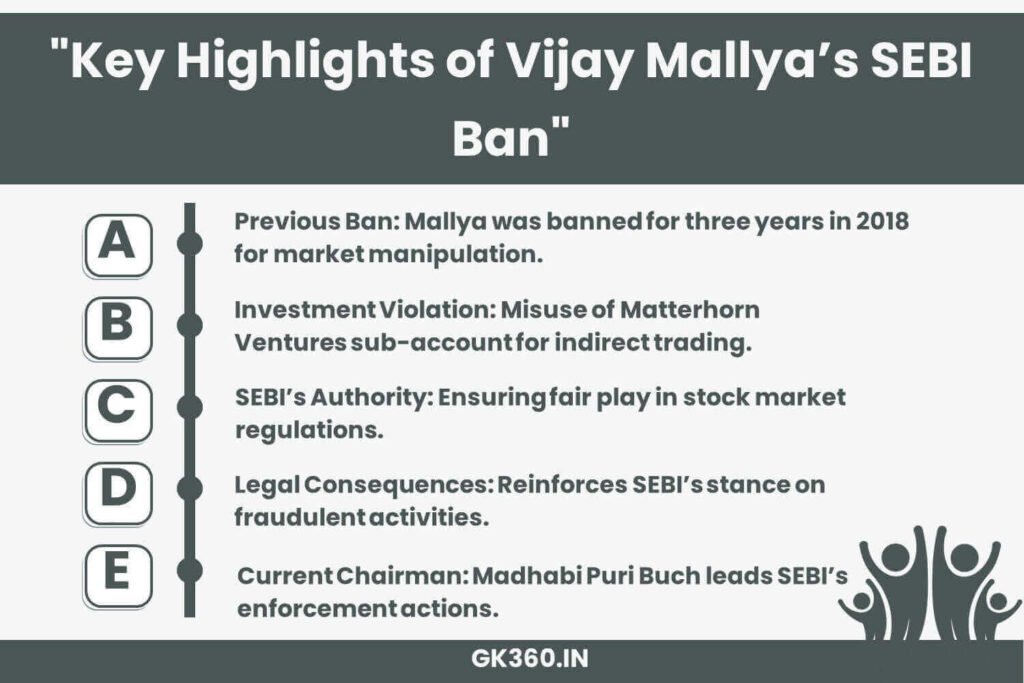Securities and Exchange Board of India Imposes Three-Year Ban on Vijay Mallya from Indian Markets
In a significant regulatory action, the Securities and Exchange Board of India (SEBI) has imposed a three-year ban on Vijay Mallya, preventing him from accessing the Indian securities market. This ban also extends to prohibiting Mallya from associating with any listed entities during this period. The decision highlights SEBI’s commitment to maintaining the integrity of the Indian financial markets and enforcing compliance with securities regulations.

Table of Contents
- Reason for the Ban
- Key Highlights of the Sanction
- Previous Sanctions on Vijay Mallya
- About SEBI
- SEBI’s Regulatory Role
- FAQs
- Conclusion
Reason for the Ban
The ban on Vijay Mallya comes after SEBI found him guilty of illegally routing funds into the Indian stock market. The transgressions occurred between January 1, 2006, and March 31, 2008, through his UBS bank accounts in London. Specifically, Mallya used a sub-account named Matterhorn Ventures, which was registered as a foreign institutional investor (FII), to trade in the shares of his own group companies, Herbertsons and United Spirits Limited (USL). This action violated the regulations intended for non-resident Indian (NRI) investments, as Mallya’s funds were indirectly funneled into the Indian market through various beneficiary accounts with UBS.
Key Highlights of the Sanction
- Restriction Details: The three-year ban not only bars Mallya from accessing the Indian securities market but also from associating with any listed entities. This comprehensive restriction aims to prevent further infractions and ensure that market participants adhere to regulatory standards.
- Investment Vehicle: Mallya’s misuse of the Matterhorn Ventures sub-account—registered as an FII—allowed him to indirectly trade in the shares of his companies, circumventing regulatory frameworks designed for direct investments.
- Previous Sanctions: This latest ban is an extension of SEBI’s previous action against Mallya, who had been barred from the securities market for three years starting June 1, 2018. That earlier sanction was related to manipulative activities and improper transactions involving the shares of USL.
Previous Sanctions on Vijay Mallya
Vijay Mallya has faced multiple regulatory actions in the past. In 2018, SEBI had imposed a similar three-year ban for engaging in fraudulent and manipulative practices in the securities market. Additionally, he has been declared a “willful defaulter” by several banks due to unpaid loans linked to Kingfisher Airlines.
About SEBI
The Securities and Exchange Board of India (SEBI) plays a crucial role in regulating and overseeing the securities and commodity markets in India. Established on April 12, 1988, SEBI was empowered with statutory powers on January 30, 1992, through the SEBI Act, 1992. With its headquarters located in Mumbai, Maharashtra, SEBI operates under the Ministry of Finance, Government of India. The current chairman of SEBI is Madhabi Puri Buch, notable for being the first woman to lead the organization.
SEBI’s Regulatory Role
SEBI’s primary mandate is to protect the interests of investors in securities, promote the development of, and regulate the securities market. The regulatory body ensures transparency, fairness, and efficiency in the functioning of the securities market, thus fostering investor confidence. By imposing stringent measures like the recent ban on Vijay Mallya, SEBI underscores its commitment to upholding market integrity and enforcing compliance with financial regulations.
FAQs
1. Why has SEBI banned Vijay Mallya?
SEBI banned Vijay Mallya for illegally routing funds into the Indian securities market through a sub-account, violating regulations meant for non-resident Indian (NRI) investments.
2. How long is the ban on Vijay Mallya?
The ban extends for three years, during which he is prohibited from accessing the Indian securities market and associating with any listed entities.
3. What was the role of Matterhorn Ventures in this case?
Matterhorn Ventures was a sub-account registered as a Foreign Institutional Investor (FII) that Mallya used to trade shares in his own companies, bypassing regulatory restrictions.
4. Has Vijay Mallya faced similar bans before?
Yes, in June 2018, SEBI imposed a three-year ban on Mallya for fraudulent activities related to the shares of United Spirits Limited (USL).
5. Who is the current chairman of SEBI?
Madhabi Puri Buch is the current chairman of SEBI, and she is the first woman to hold this position.
Conclusion
The imposition of a three-year ban on Vijay Mallya by SEBI is a significant move in reinforcing regulatory compliance and ensuring market integrity. This action not only addresses past violations but also serves as a stern warning to others about the consequences of circumventing securities regulations. As SEBI continues to enforce its regulatory framework, it remains pivotal in sustaining the trust and stability of India’s financial markets.
Key Takeaways
| Aspect | Details |
|---|---|
| Reason for Ban | Illegally routed funds into the Indian securities market using a foreign sub-account. |
| Ban Duration | Three years (prohibited from market access and listed entities). |
| Past Regulatory Actions | SEBI had imposed a similar three-year ban in 2018 for fraudulent trading. |
| Key Entities Involved | UBS London, Matterhorn Ventures, Herbertsons, and United Spirits Limited (USL). |
| Current SEBI Chairperson | Madhabi Puri Buch, the first woman to lead SEBI. |
| SEBI’s Role | Protecting investor interests and enforcing market regulations. |
| Market Impact | Strengthens transparency and prevents fraudulent financial activities. |
Related Terms:
- SEBI Vijay Mallya Ban
- SEBI Regulatory Actions
- Indian Securities Market Regulations
- Vijay Mallya Stock Market Violation
- SEBI Market Integrity
- SEBI 3-Year Ban on Vijay Mallya
- Financial Fraud in India
- SEBI Enforcement Actions
- Madhabi Puri Buch SEBI
- Illegal Stock Market Trading






